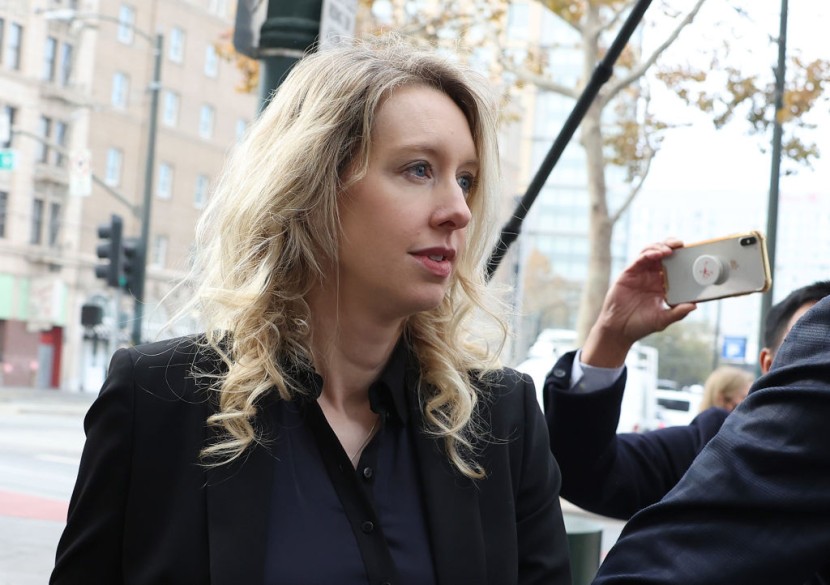
Disgraced former CEO of Theranos, Elizabeth Holmes, appears on her way to prison after an appeals court denied her request to remain free.
The decision of the Ninth Circuit Court of Appeals comes nearly three weeks after Holmes employed a last-minute legal maneuver to delay the commencement of her 11-year prison term.
Court Rejects Elizabeth Holmes' Motion
US District Court Judge Edward Davila, who sentenced her in November, had previously ordered her to surrender to authorities on April 27. Now, Davila will set a new date for Holmes to depart her current residence in the San Diego area and report to prison.
The sanction will separate Holmes from her current companion, William "Billy" Evans, and their children, William, 1-year-old, and Invicta, three months old. Holmes' pregnancy with Invicta - Latin for "invincible" or "unconquered" - began in January 2022 after she was convicted of four counts of fraud and conspiracy.
Davila has suggested that Holmes serve her time in a Texas women's penitentiary in Bryan. Whether the federal Bureau of Prisons accepted Davila's recommendation or assigned Holmes to another facility is still being determined.
Ramesh "Sunny" Balwani, Holmes' ex-lover and Theranos' top lieutenant began a nearly 13-year prison sentence in April after being convicted of 12 counts of fraud and conspiracy in a separate trial last July.
Per Politico, Balwani was incarcerated in a penitentiary in Southern California after losing an identical bid to remain free on bail while appealing his conviction.
The conviction against Holmes followed 46 days of trial testimony and other evidence that shed light on a culture of avarice and hubris that infected Silicon Valley as technology's influence on society and the economy grew more pervasive over the past two decades.
Holmes was once lauded as the "next Steve Jobs" and was said to be the youngest self-made magnate in the world. She founded Theranos after leaving Stanford University.
During her tenure as CEO, she raised millions of dollars from prominent investors, including media magnate Rupert Murdoch, former Secretary of State Henry Kissinger, and Oracle founder Larry Ellison.
However, the startup failed in 2018 after investigations revealed its ineffective technology. Using only a few droplets of blood, the blood-testing device was said to be able to perform various tests. The infamous demise of the corporation was chronicled in a television series, an HBO documentary, and a podcast, as per BBC.
Read Also : Missing Illinois Girl Featured in Netflix's 'Unsolved Mysteries' Found Alive in North Carolina After 6 Years
Rupert Murdoch to Benefit in $452 Million Restitution Bill Against Holmes
Holmes stated that she believed Theranos could revolutionize the healthcare industry with a technology that could detect hundreds of maladies and other potential problems with just a few droplets of blood.
Holmes raised approximately $1 billion from a group of investors, including Oracle co-founder Larry Ellison and media magnate Rupert Murdoch. After a Wall Street Journal investigation and regulatory evaluations uncovered hazardous flaws in Theranos's technology, these sophisticated investors lost their capital.
In his restitution ruling, Judge Davila determined that Holmes and Balwani must pay $125 million to Rupert Murdoch, the highest amount of any of the investors enumerated in his order.
The co-conspirators in the Theranos fraud must also pay $40 million to Walgreens, which became an investor in the startup after consenting to provide some of the defective blood tests in its pharmacies.
Another $14.5 million is owed to Safeway, which had also agreed to be a business partner with Theranos before withdrawing. In separate hearings, attorneys for Holmes and Balwani attempted to persuade Davila that their respective clients should be required to pay little if anything.
Holmes, whose stake in Theranos was once valued at $4.5 billion, and Balwani, whose holdings were once valued at approximately $500 million, have indicated they are close to bankruptcy after racking millions of dollars in legal fees while maintaining their innocence.
Per Guardian, Holmes's attorneys have contested her conviction based on alleged errors and malfeasance during her trial. They have also argued that errors and abuses that prejudiced the jury were so flagrant that she should be allowed to remain free pending the outcome of the appeal, a request denied by both Davila and the ninth circuit Court of Appeals.
Related Article: 'Doomsday Mom' Lori Vallow Daybell Found Guilty of Killing Children, Husband's First Wife
© 2025 HNGN, All rights reserved. Do not reproduce without permission.








